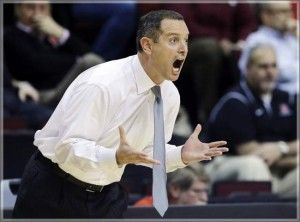Anger
Rice’s Rage Derails Him: Detecting Your Own Derailers
Want to find the quickest way to fail and lose your IQ points?
Posted April 15, 2013
In the last blog we explored the derailers of how Lance Armstrong crashed in his career like he has done many times with his bike in races.

In the last blog we explored the derailers of how Lance Armstrong crashed in his career like he has done many times with his bike in races.
Lack of impulse control we stated is the quickest way to derail a career, like getting a flat tire in the Tour de France. Your leadership is fragile and you are always under the spotlight 24/7.
Every week we have new examples of someone not being able to manage their emotions and derailing. This week it is Mike Rice the Head Basketball coach from Rutgers University, who pushed, swore, used homophobic slurs and physically abused his players. He was first suspended, fined $50,000 and then fired. Too see the outrageous leadership behavior, click below. Caution: It is quite an inflammatory video.
When you lose valuable IQ points and your judgment ability, your behavior is a mystery even to yourself. Here is how Rice explained his behavior.
"There's no explanation for what's on this film because there is no excuse for it," Rice said. "I was wrong." Rice said he let down his players, Rutgers, its fans and his family.
He said his family was "sitting in their house just huddled around because of the fact that their father was an embarrassment to them." Ben Golliver on Apr 3 2013, @blazersedge
These “Amygdala hijacks” overpower your executive functioning and thus we act quite dumber. Usually with time and reflection though we regain these precious IQ points.
The first two derailers for Armstrong, lack of impulse control and smartest person in the room were highlighted in the previous blog.
Most executives start derailing if they have three or more derailers that occur frequently, like once a month or more. Armstrong and Rice both had approximately 11 of the 18 derailers regularly present from the Derailer Detector.
Here in this blog we will we explore 9 of the 11 other derailers demonstrated by Armstrong’s story and where it applies to Rice’s behavior.
Which derailers do you deem need attention? Remember a derailer can trump your EI Competency. Knowing where your risks are can help you manage it.
In our recent research on derailers the most frequent derailers behaviors were:
1) Eccentricity – Unpredictable and odd in your behavior,
2) Smartest Person in the room syndrome – Have to be right all the time,
3) Indirect with others – Do not give the hard feedback or make the difficult decisions about people.
Below are the 9 other derailers to think about for yourself or a direct report as you read about Armstrong and Rice.
1. Drives others too hard – Micromanage and take over rather than delegate.
Armstrong was the ringleader of an elaborate doping scheme on a US Postal Service team that swept him to the top of the podium at the Tour de France time after time.
Rice is seen screaming and disrespecting his players in the goal of making them better. Driving them too hard and in an abusive manner.
2. Perfectionism – Sets unrealistic goals, Reject criticism
Armstrong fought back any criticism toward him with aggression and we now know with lies.
Rice’s desire for strong performance were his intent, but again the methodology of punishing mistakes versus focusing on successive approximation and successes were missing. This success and strength based strategy is what we saw more of with UCLA's John Wooden and other great leaders today.
3. Defensive - Blame others, inflexible and are argumentative.
For over 10 years Armstrong denied any wrong doing and wanted to bring down anybody who was telling the truth.
''He's damaged a lot of people's lives,'' said Betsy Andreu, whose husband, Frankie, was culled from Armstrong's team for not agreeing to dope. ''He has damaged the sport of cycling. Frankie was fired for not getting on the program. I never thought this day would come but it's so incredibly sad.''
You can see in the video with Rice how he blamed others and could be very defensive, like their mistakes were a personal affront to him.
4. Self-promotion- Attention seeking, overlook others accomplishments forown recognition. Armstrong’s success drive was to excess and overlooked the sacrifice and risk he put others under.
This one is less evident in what we know about Rice.
5. Lacks insight into others. This is demonstrated by a lack of empathy or compassion for others that Armstrong felt betrayed him by not going along with his lies. Their pain and suffering didn’t seem to affect him.
Great leaders know how to differentiate their leadership style to the particular followers. Some players on Rice’s team were less bothered by his style, but a few players left his program as they refused to be treated this way. Rice treated them all the same and lacked insight into how to truly motivate each of them.
6. Mistreats others – Callous, demeaning or discounting to others and their needs.
Mike Anderson, Armstrong’s former assistant said ''He gave me the firm, hard push and a shove,'' Anderson said in a telephone interview with The Associated Press. ''Made my life very, very unpleasant. It was an embarrassment for me and my family to be portrayed as liars, to be called a disgruntled employee, implying there was some impropriety on my part. It just hurt. It was completely uncalled for.''
Anderson is among the dozens, maybe hundreds, of former teammates, opponents and associates to receive the Armstrong treatment, presumably for not going along with the party line — that the now-disgraced, seven-time Tour de France cyclist didn't need to cheat to win.
Rice is also an extreme example here of verbally and physically abusing, throwing basketballs at them and taunting his players as you see in the video.
7. Self-Interest – Acts in self-interest instead of the interest of the whole organization or larger group.
This one is obvious from Armstrong’s actions for his team versus the sport or individuals he brought down.
8. Insular – Disregard of health and welfare of group outside the responsibility of your organization or team.
Winning at all costs was more important than anyone’s health, disagreements or what was good for the sport.
Very similar with Rice that his abuse was rationlized to inspire and make his team better. It embarrased, hurt, and changed players lives and college plans. In addition, it is very embarrassing for Rutgers' University and puts a blemish on the University for permitting this behavior and can effect it's recruiitng and reputation for many years to come.
9. Lack of Integrity – “Unhonest” with self and then others. "Unhonest" is a created word for when we omit, minimize and make "white lies" with the result of distrust just as if it was outright dishonest
Armstrong outright lied vehemently to others and started with himself not being honest.
Will the public be able to overlook his lies and focus on the good his has done for cancer patients and his Livestrong organization? The good news his organization is still raising millions of dollars to fight cancer.
Rice again acted as a temper tantrumed child versus a professional coach whose first job was to develop young men i a dignifed and respectful way.
Actions: As you look at these derailers and read about Lance Armstrong, Mike Rice and think of the other fallen heroes mentioned; are any of these derailers destroying your development plans? A few seconds of poor judgment and low IQ functioning can undermine months and years of high emotional intelligence functioning.
If you have some frequent derailers you need to develop a plan to mitigate them, get an executive coach, and implement some of the tools in Leading with Emotional Intelligence.
See where are you derailing? http://truenorthleadership.com/assessments-opt-in




